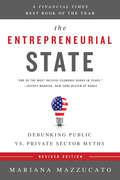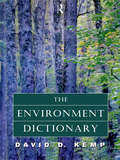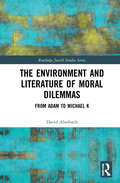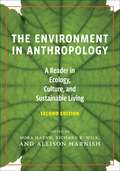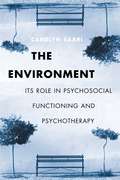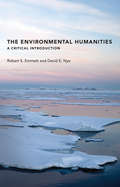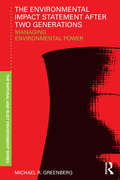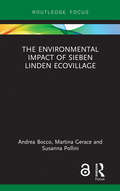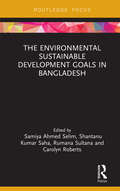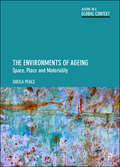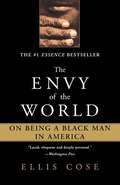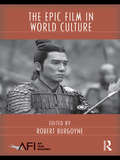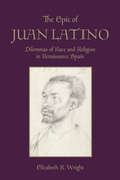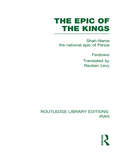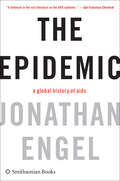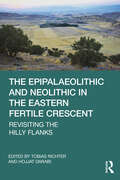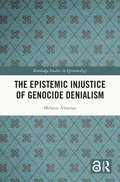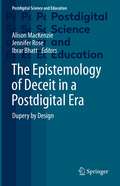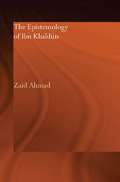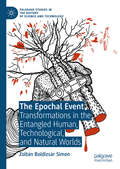- Table View
- List View
The Entertainment Industry
by Michael J. HaupertAimed at students and general readers, this text traces the historical evolution of entertainment as an economic entity in 20th-century America. The volume is organized roughly chronologically, and six representative types of entertainment are examined: vaudeville, recorded sound, movies, radio, television, and spectator sports. In the final chapter, Haupert (economics, U. of Wisconsin-LaCrosse) profiles 15 individuals who had a profound effect on the entertainment industry. Annotation ©2006 Book News, Inc. , Portland, OR (booknews. com)
The Entrepreneurial State in China: Real Estate and Commerce Departments in Reform Era Tianjin (Routledge Studies on China in Transition #Vol. 5)
by Jane DuckettJane Duckett describes in detail new state business activities in China and explains why they have appeared. Using research on the northern city of Tianjin during the 1990s, she argues that individual departments, within the Chinese state, are involved in the market economy through the establishment of their own businesses. The book demonstrates that many of these businesses are genuinely entrepreneurial in the sense of profit-seeking, risk-taking and productive, rather than rent-seeking, speculative or profiteering.This entrepreneurialism is an important new dimension of state activity in China with implications for our understanding of the Chinese state. This book develops an alternative to the local government state model and emphasises instead the State's dynamic, entrepreneurial role in the process of economic reform.
The Entrepreneurial State: Debunking Public vs. Private Sector Myths (Anthem Other Canon Economics Ser. #1)
by Mariana MazzucatoCompanies like Google and Apple heralded the information revolution, and opened the doors for Silicon Valley to grow into an engine of dazzling technological development, that today champions the free market that engendered it against the supposedly stifling encroachment of government regulation. But is that really the case? In this sharp and controversial expose, The Entrepreneurial State, Mariana Mazzucato debunks the pervasive myth that the state is a laggard, bureaucratic apparatus at odds with a dynamic private sector. Instead she reveals in case study after case study that, in fact, the opposite is true: the state is our boldest and most valuable innovator. The technology revolution would never have happened without support from the US Government. The breakthroughs--GPS, touch-screen displays, the Internet, and voice-activated AI--that enabled legendary Apple products to be smart successes were, in fact, all developed with support from the state. Mazzucato reveals that many successful entrepreneurs like Steve Jobs integrated state-funded technological developments into their products and then reaped the rewards themselves. The algorithm behind Google’s search engine was initially sponsored by NASA. And 75% of NMEs--new, often-ground-breaking drugs not derivative of existing substances--trace their research to National Institutes of Health (NIH) labs. The American government, it turns out, has been enormously successfully at stimulating scientific and technological advancement. But by 2009, just some months following the Great Recession--the US government, constrained by austerity measures, started disinvesting from its holdings in research fields like health, energy, electronics. The trend is likely to continue, and the repercussions of these policies could wreak havoc on our technology and science sectors. But Mazzucato remains optimistic. If managed correctly, state-sponsored development of Green technology, for instance, could be as efficacious as suburbanization & post-war reconstruction in the mid-twentieth century, and unleash a wide-spread golden age in the global economy. The limitations of natural resources and the threat of global warming could become the most powerful driver of growth, employment, and innovation within just one generation--but to be successful, the Green Revolution will depend on the initiatives of proactive governments. By not admitting the State’s role in economic and technological progress, we are socializing only the risks of investing in innovation, while privatizing the rewards in the hands of only a few businesses. This, Mazzucato argues, hurts both future of innovation and equity in modern-day capitalism. For policy-makers, Silicon Valley start-up founders, venture-capitalists, and economists alike, The Entrepreneurial State stirs up much needed debate and offers up a brilliant corrective to spurious beliefs: to thrive, American businesses have always and will need to depend on the support of our country’s most audacious entrepreneur, the state.
The Environment Dictionary
by David KempThe Environment Dictionary provides an essential source of information on all aspects of the environment. It includes all the basic scientific terms and concepts along with socio-economic, cultural, historical and political elements which impact on the environment. This dictionary provides the interdisciplinary approach required to understand environmental issues worldwide. Designed for a wide range of readers, the dictionary is up-to-date, easy to read and to reference and clearly and attractively presented. Selected environmental issues which have particular importance are treated in greater depth through a series of boxed case studies. A wide range of maps, diagrams, figures and photos illustrate the texts and extensie cross-referencing between entries ensures readers can build on their knowledge. References and further reading sections are drawn from a wide range of accessible sources - from newspaper articles and popular magazines to academic texts and journals and provide easy access to further study and development of readers' specific interests.
The Environment and Literature of Moral Dilemmas: From Adam to Michael K (Routledge Jewish Studies Series)
by David AberbachExploring the literature of environmental moral dilemmas from the Hebrew Bible to modern times, this book argues the necessity of cross-disciplinary approaches to environmental studies, as a subject affecting everyone, in every aspect of life. Moral dilemmas are central in the literary genre of protest against the effects of industry, particularly in Romantic literature and ‘Condition of England’ novels. Writers from the time of the Industrial Revolution to the present—including William Blake, Elizabeth Gaskell, Charles Dickens, Émile Zola, Henrik Ibsen, Anton Chekhov, T.S. Eliot, John Steinbeck, George Orwell, and J.M. Coetzee—follow the Bible in seeing environmental problems in moral terms, as a consequence of human agency. The issues raised by these and other writers—including damage to the environment and its effects on health and quality of life, particularly on the poor; economic conflicts of interest; water and air pollution, deforestation, and the environmental effects of war—are fundamentally the same today, making their works a continual source of interest and insight. Sketching a brief literary history on the impact of human behavior on the environment, this volume will be of interest to readers researching environmental studies, literary studies, religious studies and international development, as well as a useful resource to scientists and readers of the Arts.
The Environment in Anthropology
by Nora Haenn Richard WilkThe Environment in Anthropology presents ecology and current environmental studies from an anthropological point of view. From the classics to the most current scholarship, this book connects the theory and practice in environment and anthropology, giving readers a strong intellectual foundation as well as offering practical tools for solving environmental problems.Haenn and Wilk pose the most urgent questions of environmental protection: How are environmental problems mediated by cultural values? What are the environmental effects of urbanization? When do environmentalists get in conflict with indigenous peoples? How can we assess the impact of "environmentally correct" businesses such as the Body Shop? They also cover the fundamental topics of population growth, large scale development, biodiversity conservation, sustainable environmental management, indigenous groups, consumption, and globalization.Balancing landmark essays with cutting-edge scholarship, bridging theory and practice, and offering suggestions for further reading and new directions for research, The Environment in Anthropology is the ideal introduction to a burgeoning field.Contributors include: J. Peter Brosius, Billie DeWalt, Arturo Escobar, Akhil Gupta, Caren Kaplan, Conrad Kottak, David Maybury-Lewis, B.J. McCay, Kay Milton, Virginia Nazarea, Robert Netting, Vandana Shiva, Julian Steward, and Susan C. Stonich.
The Environment in Anthropology, Second Edition: A Reader in Ecology, Culture, and Sustainable Living
by Nora HaennPresents ecology and current environmental studies from an anthropological point of viewThe Environment in Anthropology presents ecology and current environmental studies from an anthropological point of view. From the classics to the most current scholarship, this text connects the theory and practice in environment and anthropology, providing readers with a strong intellectual foundation as well as offering practical tools for solving environmental problems.Haenn, Wilk, and Harnish pose the most urgent questions of environmental protection: How are environmental problems mediated by cultural values? What are the environmental effects of urbanization? When do environmentalists’ goals and actions conflict with those of indigenous peoples? How can we assess the impact of “environmentally correct” businesses? They also cover the fundamental topics of population growth, large scale development, biodiversity conservation, sustainable environmental management, indigenous groups, consumption, and globalization.This revised edition addresses new topics such as water, toxic waste, neoliberalism, environmental history, environmental activism, and REDD (Reducing Emissions from Deforestation and Forest Degradation), and it situates anthropology in the multi-disciplinary field of environmental research. It also offers readers a guide for developing their own plan for environmental action. This volume offers an introduction to the breadth of ecological and environmental anthropology as well as to its historical trends and current developments. Balancing landmark essays with cutting-edge scholarship, bridging theory and practice, and offering suggestions for further reading and new directions for research, The Environment in Anthropology continues to provide the ideal introduction to a burgeoning field.
The Environment: Its Role in Psychosocial Functioning and Psychotherapy
by Carolyn SaariSaari posits that human beings may first construct a picture of their immediate environment and then construct their identity within that environment. She argues that the psychotherapeutic profession must extend its range to include socio-cultural-economic factors and she includes ample case studies to support her position.
The Environment: Its Role in Psychosocial Functioning and Psychotherapy
by Carolyn SaariChallenging Freud's assumption that an individual first develops intrapsychically and is only later confronted with the demands of external reality, Carolyn Saari posits that human beings initially construct a picture of their immediate environment and then construct their identities within that environment. The Environment is an argument in three parts. Part 1 discusses psychoanalytic and developmental theory, showing that while such theory has assumed the existence of an environment, it has taken for granted and therefore left unexamined its role in human development. Michel Foucault's theory of social control provides the framework for Part 2, which examines psychotherapy's capacity either to liberate or to repress the client. Part 3 relates the practical benefits and broader implications of an inclusion of environmental considerations in the practice of psychotherapy.
The Environmental Humanities: A Critical Introduction (The\mit Press Ser. #1)
by David E. Nye Robert S. EmmettA concise overview of this multidisciplinary field, presenting key concepts, central issues, and current research, along with concrete examples and case studies.The emergence of the environmental humanities as an academic discipline early in the twenty-first century reflects the growing conviction that environmental problems cannot be solved by science and technology alone. This book offers a concise overview of this new multidisciplinary field, presenting concepts, issues, current research, concrete examples, and case studies. Robert Emmett and David Nye show how humanists, by offering constructive knowledge as well as negative critique, can improve our understanding of such environmental problems as global warming, species extinction, and over-consumption of the earth's resources. They trace the genealogy of environmental humanities from European, Australian, and American initiatives, also showing its cross-pollination by postcolonial and feminist theories. Emmett and Nye consider a concept of place not synonymous with localism, the risks of ecotourism, and the cultivation of wild areas. They discuss the decoupling of energy use and progress, and point to OECD countries for examples of sustainable development. They explain the potential for science to do both good and harm, examine dark visions of planetary collapse, and describe more positive possibilities—alternative practices, including localization and degrowth. Finally, they examine the theoretical impact of new materialism, feminism, postcolonial criticism, animal studies, and queer ecology on the environmental humanities.
The Environmental Impact Statement After Two Generations: Managing Environmental Power (Natural and Built Environment Series)
by Michael R. GreenbergThis book is about a subject that Michael Greenberg has worked on and lived with for almost forty years. He was brought up in the south Bronx at a time when his neighborhood suffered from terrible air and noise pollution, and domestic waste went untreated into the Hudson River. For him, the National Environmental Policy Act (NEPA) was a blessing. It included an ethical position about the environment, and the law required some level of accountability in the form of an environmental impact statement, or EIS. After forty years of thinking about and working with NEPA and the EIS process, Greenberg decided to conduct his own evaluation from the perspective of a person trained in science who focuses on environmental and environmental health policies. This book of carefully chosen real case studies goes beyond the familiar checklists of what to do, and shows students and practitioners alike what really happens during the creation and implementation of an EIS.
The Environmental Impact of Sieben Linden Ecovillage
by Andrea Bocco Martina Gerace Susanna PolliniThe Open Access version of this book, available at https://www.taylorfrancis.com/books/9780367145644, has been made available under a Creative Commons Attribution-Non Commercial-No Derivatives 4.0 license. Environmental impact assessment is widely taught and researched, but rarely covers both lifestyle and building construction in a town or neighbourhood. This book provides a broad assessment of the environmental impact of the ecovillage Sieben Linden in Germany. The ecovillage was founded in 1997 and has a population of over one hundred people. This book shows how raising the awareness of individuals and adopting a consistent way of community living can be environmentally friendly. This applies both to everyday practices and the way the houses in the ecovillage are built. The tools used to measure the impact are Ecological Footprint and Carbon Footprint methodologies, making use of indicators such as Primary Energy Intensity and Global Warming Potential. Despite the difficulties encountered by using standardised methodologies, these research tools provide an overall assessment and have allowed comparisons with selected, similar cases and general values from statistic sources. This book will be of great use to professionals and scholars in the fields of environmental impact assessment, particularly at the town/district/city level, and of city and ecovillage management. It will particularly appeal to those engaged in a Sustainable Development Goal #11 perspective, as well as environmental policy makers at the local level.
The Environmental Sustainable Development Goals in Bangladesh (Routledge Focus on Environment and Sustainability)
by Carolyn Roberts Rumana Sultana Samiya Selim Shantanu SahaThis book examines the key Sustainable Development Goals (SGDs) relating to environmental sustainability and provides a cutting-edge assessment of current progress with the view of achieving these goals by 2030. Within South Asia, the book pays particular attention to Bangladesh, as a country representative of emerging economies which are struggling to meet their goals. Drawing on the three pillars of sustainability, the volume addresses the following goals: Clean Water and Sanitation, Affordable and Clean Energy, Responsible Consumption and Production, Climate Action, Life Below Water and Life on Land (Goals 6, 7, 12, 13, 14 and 15). The book examines where progress has been made and why some key targets have not been achieved or will be difficult to achieve. The chapters focus on environmental sustainability in different sectors such as agriculture, renewable energy, fisheries and aquaculture and natural resource management. The aim of this volume is to highlight key lessons and recommendations on how research in the various sectors can feed into the pathway of meeting the SDGs highlighted in this book. The analysis derived from Bangladesh can be used as a reference point for other developing nations in Asia, and globally, with a view to guiding policy for the achievement of the SGDs. This book will be of great interest to students and scholars of sustainable development and climate change, as well as practitioners and policymakers involved in sustainable development and disaster management.
The Environments of Ageing: Space, Place and Materiality (Ageing in a Global Context)
by Sheila PeaceProviding the first UK assessment of environmental gerontology, this book enriches current understanding of the spatiality of ageing. Sheila Peace considers how places and spaces contextualise personal experience in varied environments, from urban and rural to general and specialised housing. Situating extensive research within multidisciplinary thinking, and incorporating policy and practice, this book assesses how personal health and wellbeing affect different experiences of environment. It also considers the value of intergenerational and age-related living, the meaning of home and global to local concerns for population ageing. Drawing on international comparisons, this book offers a valuable resource for new research and important lessons for the future.
The Envy of the World
by Ellis CoseWith an eloquence and compassion reminiscent of James Baldwin's Letter to My Nephew, Ellis Cose presents a frank and realistic examination of the daunting challenges facing black men in twenty-first-century America and offers a way out of the cycle of defeatism and despair that wreaks havoc on America's black communities. Black men have never had more opportunity for success than they do today. Yet, as Ellis Cose bluntly puts it, "We are watching the largest group of black males in history stumbling through life with a ball and chain wrapped around their legs. If brought together in one incorporated region, the population of black males behind bars would instantly become the twelfth largest urban area in America." Add to that the ravages of AIDS, murder, poverty, and illiteracy, the raging anger between many black men and women, and the widening gap separating the black elite from the so-called underclass, and you have a prescription for a paralyzing pessimism. But even as he acknowledges the systemic obstacles that confront black men of all social strata, Ellis Cose refuses to accept them as reasons for giving up or giving in. In powerful and stirring prose, Cose rails against the historical worldview that has categorized academic achievement as a source of shame instead of pride in many black communities; he also outlines steps black males can take to enhance their odds for success. With insightful anecdotes about a broad range of black men -- from Franklin Raines, the first black man to run a Fortune 500 company, to unlettered ex-prisoners -- Cose documents the amazing journey the black race has made, and contemplates the challenges ahead. Both a warning of the vast social tragedy that is wasted black potential and a vital call to arms that can enable black men to reclaim their destiny, The Envy of the World is an honest and important book for anyone concerned about the future of America.
The Epic Film in World Culture (AFI Film Readers)
by Robert BurgoyneWith the recent release of spectacular blockbuster films from Gladiator to The Lord of the Rings trilogy, the epic has once again become a major form in contemporary cinema. This new volume in the AFI Film Readers series explores the rebirth of the epic film genre in the contemporary period, a period marked by heightened and conflicting appeals to national, ethnic, and religious belonging.The orginal essays in this volume explore the tension between the evolving global context of film production and reception and the particular provenance of the epic as an expression of national mythology and aspirations, challenging our understanding of epics produced in the present as well as our perception of epic films from the past. The contributors will explore new critical approaches to contemporary as well as older epic films, drawing on ideas from cultural studies, historiography, classics, and film studies.
The Epic of Juan Latino: Dilemmas of Race and Religion in Renaissance Spain
by Elizabeth WrightIn The Epic of Juan Latino, Elizabeth R. Wright tells the story of Renaissance Europe's first black poet and his epic poem on the naval battle of Lepanto, Austrias Carmen (The Song of John of Austria).Piecing together the surviving evidence, Wright traces Latino's life in Granada, Iberia's last Muslim metropolis, from his early clandestine education as a slave in a noble household to his distinguished career as a schoolmaster at the University of Granada. When intensifying racial discrimination and the chaos of the Morisco Revolt threatened Latino's hard-won status, he set out to secure his position by publishing an epic poem in Latin verse, the Austrias Carmen, that would demonstrate his mastery of Europe's international literary language and celebrate his own African heritage.Through Latino's remarkable, hitherto untold story, Wright illuminates the racial and religious tensions of sixteenth-century Spain and the position of black Africans within Spain's nascent empire and within the emerging African diaspora.
The Epic of the Kings: Shah-Nama the national epic of Persia (Routledge Library Editions: Iran)
by Ferdowsi‘Among the many national poets of historical Persia, Ferdowsi is perhaps the greatest...In this superb translation of the epic, the Western reader would not fail to discern clear equivalents of chapters in Genesis, The Odyssey, Paradise Lost or the Canterbury Tales.’ Islamic ReviewThe Shah-nama is the national epic poem of Persia. Written in the tenth century it contains the country’s myths, legends and historic reminiscences. This edition makes available a valuable prose translation selecting the most representative parts of the original including the stories of Rustum, the giant hero and his son Sohrab.
The Epidemic: A Global History of Aids
by Jonathan EngelFrom the Castro bathhouses to AZT and the denial of AIDS in South Africa, this sweeping look at AIDS covers the epidemic from all angles and across the world. Engel seamlessly weaves together science, politics, and culture, writing with an even hand—noting the excesses of the more radical edges of the ACT UP movement as well as the conservative religious leaders who thought AIDS victims deserved what they got. The story of AIDS is one of the most compelling human dramas of our time, both in its profound tragedy and in the extraordinary scientific efforts impelled on its behalf. For gay Americans, it has been the story of the past generation, redefining the community and the community's sexuality. For the Third World, AIDS has created endless devastation, toppling economies, social structures, and whole villages and regions. And the worst may yet be to come: AIDS is expanding quickly into India, Russia, China, and elsewhere, while still raging insub-Saharan Africa.A distinguished medical historian, Engel lets his characters speak for themselves. Whether gay activists, government officials, public health professionals, scientists, or frightened parents of schoolchildren, they responded as best they could to tragic happenstance that emerged seemingly from nowhere. There is much drama here, and human weakness and heroism too. Writing with vivid immediacy, Engel allows us to relive the short but tumultuous history of a modern scourge.
The Epipalaeolithic and Neolithic in the Eastern Fertile Crescent: Revisiting the Hilly Flanks
by Tobias Richter Hojjat DarabiThis volume brings together the latest results and discussions from research carried out in the eastern Fertile Crescent, the so-called hilly flanks, and adjacent regions, as well as providing key historical perspectives on earlier fieldwork in the region. The emergence of sedentary food producing societies in southwest Asia ca. 10,000 years ago has been a key research focus for archaeologists since the 1930s. This book provides a balance to the weight of work undertaken in the western Fertile Crescent, namely the Levant and southern Anatolia. This preference has led to a heavy emphasis on these regions in discussions about where, when and how the transition from hunting and gathering to plant cultivation and animal domestication occurred. Chapters assess the role of the eastern Fertile Crescent as a key region in the Neolithization process in southwest Asia, highlighting the key and important contributions people in this region made to the emergence of sedentary farming societies. This book is primarily aimed at academics researching the transition from hunting and gathering to agriculture in southwest Asia. It will also be of interest to archaeologists working on this transition in other parts of Eurasia.
The Epipalaeolithic and Neolithic in the Eastern Fertile Crescent: Revisiting the Hilly Flanks
by Tobias Richter Hojjat DarabiThis volume brings together the latest results and discussions from research carried out in the eastern Fertile Crescent, the so-called hilly flanks, and adjacent regions, as well as providing key historical perspectives on earlier fieldwork in the region. The emergence of sedentary food producing societies in southwest Asia ca. 10,000 years ago has been a key research focus for archaeologists since the 1930s. This book provides a balance to the weight of work undertaken in the western Fertile Crescent, namely the Levant and southern Anatolia. This preference has led to a heavy emphasis on these regions in discussions about where, when and how the transition from hunting and gathering to plant cultivation and animal domestication occurred. Chapters assess the role of the eastern Fertile Crescent as a key region in the Neolithization process in southwest Asia, highlighting the key and important contributions people in this region made to the emergence of sedentary farming societies.This book is primarily aimed at academics researching the transition from hunting and gathering to agriculture in southwest Asia. It will also be of interest to archaeologists working on this transition in other parts of Eurasia.
The Epistemic Injustice of Genocide Denialism (Routledge Studies in Epistemology)
by Melanie AltanianThe injustice of genocide denial is commonly understood as a violation of the dignity of victims, survivors, and their descendants, and further described as an assault on truth and memory. This book rethinks the normative relationship between dignity, truth, and memory in relation to genocide denial by adopting the framework of epistemic injustice.This framework performs two functions. First, it introduces constructive normative vocabulary into genocide scholarship through which we can gain a better understanding of the normative impacts of genocide denial when it is institutionalized and systematic. Second, it develops and enriches current scholarship on epistemic injustice with a further, underexplored case study. Genocide denialism is relevant for political and social epistemology, as it presents a substantive epistemic practice that distorts normativity and social reality in ways that maintain domination. This generates pervasive ignorance that makes denial rather than recognition of genocide appear as the morally and epistemically right thing to do. By focusing on the prominent case of Turkey’s denialism of the Armenian genocide, the book shows the serious consequences of this kind of epistemic injustice for the victim group and society as a whole.The Epistemic Injustice of Genocide Denialism will appeal to students and scholars working in social, political, and applied epistemology, social and political philosophy, genocide studies, Armenian studies, and memory studies.The Open Access version of this book, available at www.taylorfrancis.com, has been made available under a Creative Commons Attribution-Non Commercial-No Derivatives (CC-BY-NC-ND) 4.0 license. Any third party material in this book is not included in the OA Creative Commons license, unless indicated otherwise in a credit line to the material. Please direct any permissions enquiries to the original rightsholder.Funded by: Swiss National Science Foundation
The Epistemology of Deceit in a Postdigital Era: Dupery by Design (Postdigital Science and Education)
by Jennifer Rose Ibrar Bhatt Alison MacKenzieThis edited book collection offers strong theoretical and philosophical insight into how digital platforms and their constituent algorithms interact with belief systems to achieve deception, and how related vices such as lies, bullshit, misinformation, disinformation, and ignorance contribute to deception. This inter-disciplinary collection explores how we can better understand and respond to these problematic practices. The Epistemology of Deceit in a Postdigital Era: Dupery by Design will be of interest to anyone concerned with deception in a ‘postdigital’ era including fake news, and propaganda online. The election of populist governments across the world has raised concerns that fake news in online platforms is undermining the legitimacy of the press, the democratic process, and the authority of sources such as science, the social sciences and qualified experts. The global reach of Google, YouTube, Twitter, Facebook, and other platforms has shown that they can be used to create and spread fake and misleading news quickly and without control. These platforms operate and thrive in an increasingly balkanised media eco-system where networks of users will predominantly access and consume information that conforms to their existing worldviews. Conflicting positions, even if relevant and authoritative, are suppressed, or overlooked in everyday digital information consumption. Digital platforms have contributed to the prolific spread of false information, enabled ignorance in online news consumers, and fostered confusion over determining fact from fiction. The collection explores: Deception, what it is, and how its proliferation is achieved in online platforms. Truth and the appearance of truth, and the role digital technologies play in pretending to represent truth. How we can counter these vices to protect ourselves and our institutions from their potentially baneful effects. Chapter 15 is available open access under a Creative Commons Attribution 4.0 International License via link.springer.com.
The Epistemology of Ibn Khaldun (Culture and Civilization in the Middle East)
by Zaid AhmadThis is an analytical examination of Ibn Khaldun's epistemology, centred on Chapter Six of the Muqaddima. In this chapter, entitled The Book of Knowledge (Kitab al'Ilm), Ibn Khaldun sketched his general ideas about knowledge and science and its relationship with human social organisation and the establishment of a civilisation.
The Epochal Event: Transformations in the Entangled Human, Technological, and Natural Worlds (Palgrave Studies in the History of Science and Technology)
by Zoltán Boldizsár SimonThis book is a unique attempt to capture the growing societal experience of living in an age unlike anything the world has ever seen. Fueled by the perception of acquiring unprecedented powers through technologies that entangle the human and the natural worlds, human beings have become agents of a new kind of transformative event. The ongoing sixth mass extinction of species, the prospect of a technological singularity, and the potential crossing of planetary boundaries are expected to trigger transformations on a planetary scale that we deem catastrophic and try to avoid. In making sense of these prospects, Simon’s book sketches the rise of a new epochal thinking, introduces the epochal event as an emerging category of a renewed historical thought, and makes the case for the necessity of bringing together the work of the human and the natural sciences in developing knowledge of a more-than-human world.


